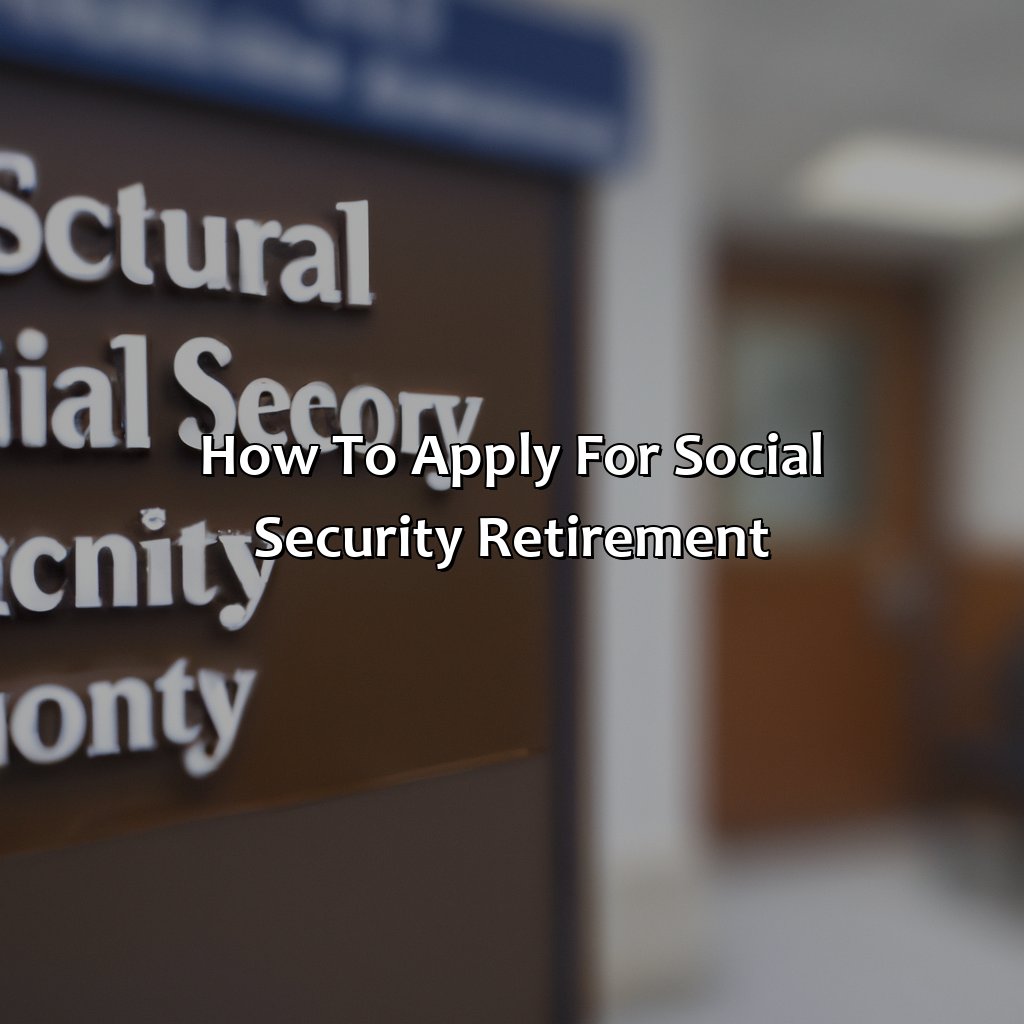When Can You Get Social Security Retirement?
Key Takeaway:
- You can receive Social Security retirement benefits at age 62 or older, but the amount you receive increases if you wait until your full retirement age (between 66 and 67, depending on your birth year).
- In order to qualify for Social Security retirement benefits, you must have earned at least 40 work credits throughout your lifetime, with a maximum of four credits earned per year.
- You can apply for Social Security retirement benefits online, by phone, or in person. Factors that can affect your benefits include early retirement reduction, delayed retirement credit, spousal benefits, and the maximum Social Security retirement benefit available.
Do you want to retire but worry that you don’t have enough saved up? Social Security Retirement can help. You have the right to start collecting those benefits when you reach a certain age. Read on to learn more about when you can start collecting.
Eligibility for Social Security Retirement Benefits
To be eligible for Social Security retirement benefits, you must meet certain criteria. Our section on ‘Eligibility for Social Security Retirement Benefits’ has two subsections – ‘Age Requirements’ and ‘Work Credits Requirement’. These will help you understand what you need to do to qualify for the benefits.

Image credits: retiregenz.com by Harry Woodhock
Age Requirements
When it comes to qualifying for Social Security Retirement Benefits, there are specific age requirements that must be met. Generally, individuals must be at least 62 years old to start receiving benefits. However, the longer an individual waits to start collecting benefits, the higher their monthly benefit amount will be. This is because benefits increase each year until an individual reaches full retirement age, which varies between 66 and 67 depending on the individual’s birth year.
There are a few other age-related factors that individuals should keep in mind regarding Social Security Retirement Benefits. For example, individuals who choose to collect benefits before reaching full retirement age may have their monthly amount reduced permanently. On the other hand, those who delay collecting benefits beyond full retirement age may receive increased monthly amounts through delayed retirement credits.
It’s important to note that while age is a primary factor in qualifying for Social Security Retirement Benefits, it isn’t the only one. Other eligibility requirements include payment into Social Security through payroll taxes and earning enough work credits throughout an individual’s career.
One thing is certain – planning for retirement is crucial and understanding how Social Security Retirement Benefits work can go a long way towards ensuring financial stability during one’s golden years. For example, consider the story of Jane who retired at 62 without considering her Social Security options. She later realized she could have received much higher monthly payments by delaying her benefits until full retirement age but unfortunately missed out on many thousands of dollars over time due to lack of proper planning.
Don’t worry, even if you’ve never successfully completed a game of Solitaire, you may still be eligible for social security retirement benefits.
Work Credits Requirement
To qualify for Social Security Retirement Benefits, you need to meet the criteria of obtaining enough work credits. Work credits requirement refers to an individual’s earnings of credits by working and paying taxes into the Social Security system.
The number of work credits required depends on your birth year, and it increases periodically. If you were born in or after 1929, then you need a minimum of 40 work credits to be eligible for retirement benefits. The maximum number of credits that an individual can earn per year is four.
It is important to note that obtaining more work credits will not give you extra retirement benefits but would increase your disability and survivor benefits if needed. Additionally, the earned income limit for Social Security recipients changes every year.
Pro Tip: You can check your Social Security statement through their official website to keep track of your earned credits and eligibility status regularly.
Ready to retire? Applying for Social Security Retirement is easier than finding a parking spot at the mall during Christmas season.
How to Apply for Social Security Retirement
To get Social Security Retirement, you have options! You can apply online, by phone, or in person. Check out the “How to Apply for Social Security Retirement” section for help.

Image credits: retiregenz.com by David Woodhock
Applying for Benefits Online
When it comes to gaining retirement benefits from the Social Security Administration (SSA), using their online portal eases the process significantly. Here is a quick guide on how to use ‘Online Delivery of Retirement Application (ODRA)’ and apply for your benefits conveniently and safely.
- Visit SSA’s official website, ssa.gov, and click on ‘Apply for Retirement Benefits’.
- Read all the necessary information and instructions before you proceed. Click on the ‘Start a New Application’ button when ready.
- Create an account with SSA or log in if you already have one. Provide all the relevant personal information.
- Complete your application by responding to all the questions accurately. You can save and return to it later if needed. Submit it once done.
Apart from saving time, applying online saves paper and reduces carbon emissions as well. However, make sure to double-check all details before submitting your application.
To ensure a speedy receipt of your benefits once approved, provide accurate and complete financial details. SSA may require additional documentation such as birth certificates or proof of income if they cannot verify this information electronically.
Get ready to have a phone call that lasts longer than a sitcom episode when you apply for Social Security retirement by phone.
Applying by Phone or in Person
When it comes to initiating your social security retirement benefits, you can choose between two options– initiating the process in person or by phone.
- By Phone – Calling the Social Security Administration (SSA) and speaking with a representative about applying for retirement is a popular way to initiate the process. This method is typically smoother since retirees do not have to leave their homes.
- In Person – If you opt to apply in person, visit your local Social Security office at least three months before the month that you would like to begin receiving benefits. You can schedule an appointment online or call them beforehand.
- Documents – Ensure you have the necessary documents for either option before applying. Some documents that may be required include birth certificate, citizenship records, W-2s, and copies of your tax returns from previous years.
- Information Needed – In order to apply for social security retirement benefits, you will need certain information related to your current living situation and work history. This includes details such as your income from this year, expected future earnings based on estimated increases and work status going forward.
- Processing Time – Once you have completed your application process through either means mentioned above (in-person meeting or phone), it takes about 30 days on average for SSA to process these requests.
If applying in person seems daunting or if keeping up with paperwork is not your forte, employing someone else who has experience navigating SSA may be a good idea.
According to data analysis firm, Bloomberg Government’s study released in December 2020; “Social Security instituted no-cost telephone appointments after closing many offices in March due to Covid-19 restrictions,” resulting in appointment wait time of up to 34 days indicative of understaffing as some office closures were made permanent.”
Your retirement benefits may fluctuate more than the stock market, thanks to these pesky factors affecting your social security payments.
Factors Affecting Social Security Retirement Benefits
To grasp the elements that affect your social security retirement benefits, look into:
- Early Retirement Reduction
- Delayed Retirement Credit
- Spousal Benefits
- Maximum Social Security Retirement Benefit.
Each one provides a special solution that can influence the amount of social security retirement benefits you get.

Image credits: retiregenz.com by Yuval Arnold
Early Retirement Reduction
Retire early and receive reduced Social Security benefits. Benefit reductions depend on the distance between the time you retire and your Full Retirement Age (FRA). If you retire before reaching FRA, reduction rates vary based on the number of months left until FRA. Bear in mind that this decrease lasts for good; however, increases adjusted to inflation yield us yearly to raise retirement benefit levels.
If you choose to draw retirement at 62 years of age, three things can happen: a) presumed reduced benefits will last until death b) if you are currently working while receiving benefits, $1 is deducted from your check for every $2 over the annual earnings limit c) full retirement age is pushed back.
Pro Tip: Be sure to review SSA.gov or consult with an expert retirement planner before deciding on claiming Social Security benefits early.
Looks like procrastination pays off after all – the delayed retirement credit can give you a bigger Social Security paycheck if you hold off on retiring.
Delayed Retirement Credit
Delaying Social Security Retirement Benefits Can Increase Your Payouts
Delaying your Social Security retirement benefits beyond your full retirement age can increase your monthly payouts. This is known as the delayed retirement credit, which will add a certain percentage to your benefits depending on the number of months you delay claiming them.
By delaying your Social Security benefits, you can earn credits up to age 70, which can increase your benefits by an additional 8% for each year. This means, if you wait until the age of 70 to claim your benefits and retire at full retirement age, your monthly payout could be much higher.
It’s important to note that delaying retirement credits do not apply after reaching 70 years old. You should be aware of this feature when making plans regarding Social Security payments and choose your timing according to it.
Pro Tip: Delaying Social Security may not be right for everyone, as life expectancy and financial needs must also come into consideration. Consulting with a financial advisor can help make informed decisions about claiming Social Security and best align this decision with overall financial goals.
Marriage is like a game of Social Security roulette, where the lucky ones get spousal benefits and the rest of us just have to hope our 401(k) survives.
Spousal Benefits
The requirements for claiming Spousal Benefits are:
- The spouse must be at least 62 years old and the primary beneficiary must have already claimed their social security benefits.
- The maximum amount of spousal benefit is equal to 50% of the primary beneficiary’s benefit.
- If the spouse has their own work record, they may be eligible for a higher benefit based on their own earnings instead of claiming the spousal benefit.
- Spouses who divorced before 10 years of marriage are not eligible for spousal benefits unless they remarried their ex-spouse.
- Claiming spousal benefits early may result in a permanent reduction in benefits.
It is important to note that claiming Spousal Benefits does not affect the primary beneficiary’s own retirement benefits. In addition, if the spouse outlives the primary beneficiary, they may be eligible for survivor’s benefits.
Don’t miss out on potential Spousal Benefits! Consider your options carefully and make sure to file for these benefits if you meet the eligibility requirements.
Want to retire like a boss? Get the maximum social security retirement benefit and you’ll be living like a Kardashian, minus the drama and extravagant spending.
Maximum Social Security Retirement Benefit
Retirement benefits impact a retiree’s lifestyle and hence is crucial to plan. Social Security retirement benefit is based on several factors such as age, work history, and income. The highest payout for Social Security Retirement benefits can vary but is limited by the yearly contribution cap and the recipient’s age of retirement.
Additionally, recipients must have a minimum of 10 years (40 quarters) of work history to be eligible for retirement benefits. Thus, the amount received depends on various factors but there is an upper ceiling cap beyond which one cannot earn from Social Security.
It is important not to miss out on any qualified credits towards your social security retirement benefits. It’s never too late to start planning your future, so ensure you are optimizing your Social Security benefits early to alleviate financial stress later in life.
Five Facts About When You Can Get Social Security Retirement:
You can start receiving Social Security retirement benefits as early as age 62, but your monthly benefit amount will be reduced. (Source: SSA)
Full retirement age varies depending on your birth year, but it ranges from 66 to 67. (Source: SSA)
If you delay your benefits past full retirement age, your monthly benefit amount will increase. (Source: SSA)
The earliest age you can receive reduced widows or widowers benefits is age 60 (50 if disabled). (Source: SSA)
There is no maximum age to receive Social Security retirement benefits. (Source: SSA)
FAQs about When Can You Get Social Security Retirement?
When can you get Social Security retirement?
You can begin receiving Social Security retirement benefits as early as age 62. However, your benefit amount will be reduced if you start receiving benefits before your full retirement age.
What is full retirement age?
Full retirement age is the age at which you can receive your full Social Security retirement benefit. For people born between 1943 and 1954, full retirement age is 66. For those born in 1955 or later, the full retirement age gradually increases until it reaches age 67 for those born in 1960 or later.
Can you delay receiving Social Security retirement benefits?
Yes, you can delay receiving Social Security retirement benefits until age 70. By delaying, your monthly benefit amount will increase. The amount of increase depends on your birth year and the number of months you delay.
What is the maximum Social Security retirement benefit?
The maximum Social Security retirement benefit that an individual can receive depends on the year they were born and the age at which they begin receiving benefits. For those who reach age 62 in 2020, the maximum monthly benefit is $3,011.
What happens to your Social Security retirement benefits if you continue to work?
If you continue to work while receiving Social Security retirement benefits and you are younger than full retirement age, your benefits may be reduced if you earn more than a certain amount. Once you reach full retirement age, your benefits will not be reduced regardless of how much you earn.
What happens to your Social Security retirement benefits if you die?
If you die before collecting Social Security retirement benefits, your surviving spouse or children may be eligible for survivor benefits. The amount of the benefit depends on various factors, including the age of the survivors and the length of time you worked and paid into Social Security.
 Checkout this IRS Loophole
Checkout this IRS Loophole 
